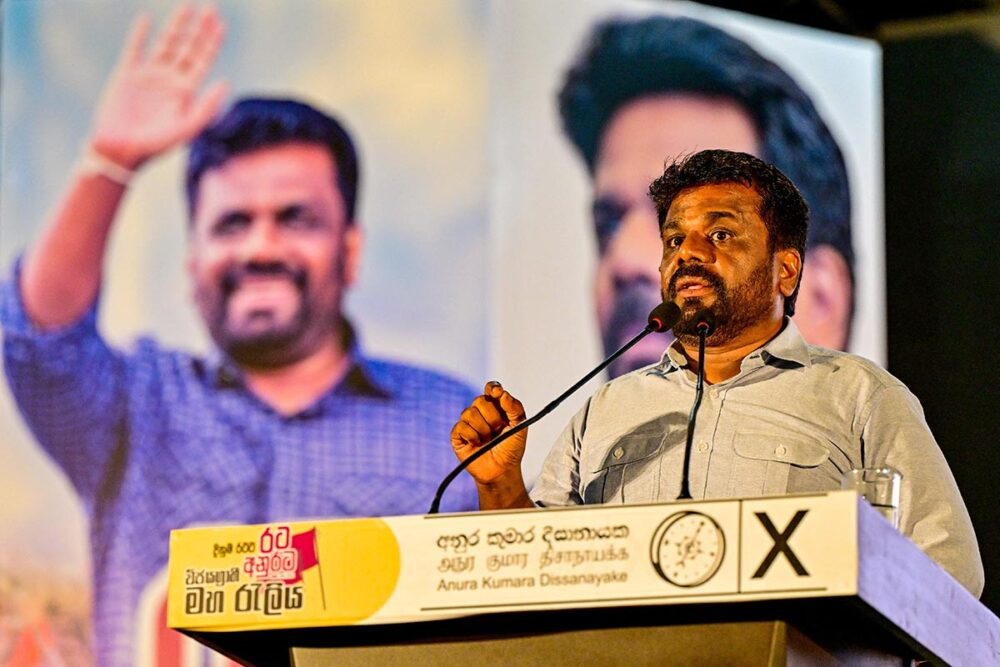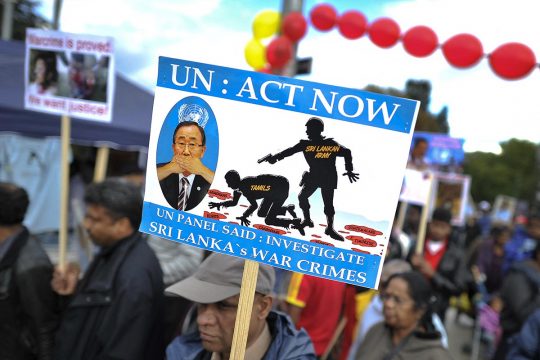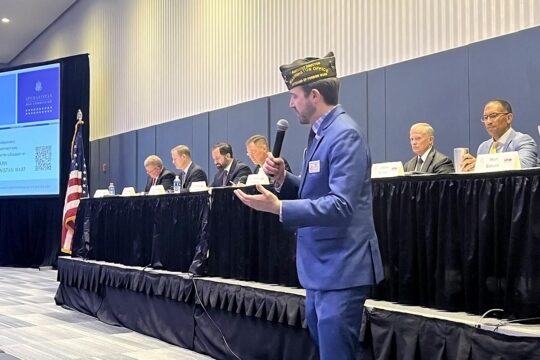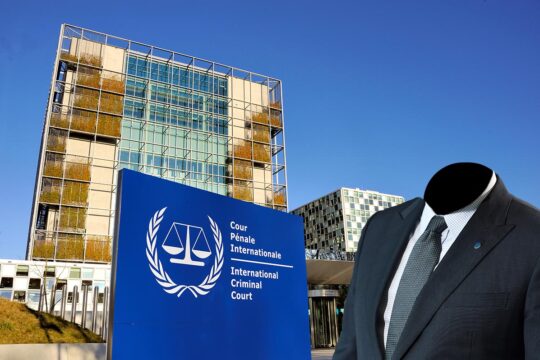The election in 2024 in Sri Lanka of the National People’s Power (NPP) party - a left-wing alliance of political parties, trades unions and others, formed as an alternative to the traditional ruling parties - has raised some hopes in terms of economic stability and fighting corruption, but most observers are not very optimistic that justice and human rights will be its priorities.
“There doesn’t seem to be a whole lot of enthusiasm from the affected communities that there would be a change on transitional justice under the new government, because they’ve been disappointed by consecutive Sri Lankan governments in the past,” says Thyagi Ruwanpathiranaof Amnesty International in the capital Colombo.“Victims have time and time again demanded truth and justice for the forcibly disappeared; repeal of the draconian anti-terror legislation (Prevention of Terrorism Act); release of all land held by the military in the North and East back to its civilian owners; and to expedite cases of extra-judicial killings, enforced disappearances and mass graves before the domestic justice system.”
Anushani Alagarajah, executive director of the Adayaalam Centre for Policy Research in Jaffna, agrees that victims in the Tamil community have lost trust in government transitional justice processes, which she says have not served them. “If the government wants to earn their trust,” says this Tamil activist and researcher, “it can go for the low-hanging fruits” such as releasing land seized by the military and releasing information on the tens of thousands of enforced disappearances during the civil war.
Last year’s elections came in the wake of mass protests in 2022 against corruption and economic meltdown, which led to the ouster of former president Gotabaya Rajapaksa. In September 2024, leftist Anura Kumara Dissanayake - who had only won 3% of the vote in the previous presidential election in 2019 - was elected President with a much higher score and well ahead of his rivals. In addition, the NPP party won a majority in parliament in November.
Still “rooted in Sinhala Buddhist nationalism”
“The economic crisis and the substantial credibility loss of the two main political party blocs created a space for the NPP, especially President Dissanayake, who is very charismatic,” says Alan Keenan, Sri Lanka Project Director for the International Crisis Group. “But their difference is in terms of questions of corruption, economic justice and political background. The leadership mostly comes from modest backgrounds, even poor backgrounds, which is very different from the established parties, and they are promising a new form of governance -- what they call a ‘new political culture’. Some of their policies and emphasis could give one hope of some movement on questions of human rights, accountability and ending the culture of impunity.”
But he says the NPP’s roots and traditions come, like previous governments, out of Sinhala Buddhist nationalism, which is “at the heart of the ethnic conflict, the war, and the legitimating ideology against the Tamil militants, justification of terrible violence and war crimes”.
Former human rights lawyer and mass atrocity researcher Kate Cronin-Furman, now associate professor of political science at University College London, agrees. “It is true that for the first time we are seeing a government that is not from the traditional political elite,” she told Justice Info. “But it is not clear that power structures within the military have changed significantly or are going to change significantly. And their electoral constituency does not hold pro-justice attitudes. So these may not be individuals in the highest office who are personally linked [as in previous governments] to atrocities in the civil war, but it is not in their direct political interest to pursue justice.”
Sri Lanka’s civil war (1983-2009) left at least 40,000 people dead, 280,000 displaced and 65,000 disappeared. It pitted the Sinhala Buddhist government against the Liberation Tigers of Tamil Eelam (LTTE) fighting for a separate state for the Hindu Tamil minority. The final stage of the war in 2009 was particularly brutal, with Tamil civilians being used as human shields by the military, subjected to arbitrary arrest and torture.
Campaign promises already forgotten?
During his election campaign, President Dissanayake promised to reform the Prevention of Terrorism Act, a key demand of the Tamil community. This law has been used by successive governments to arbitrarily arrest and hold for long periods people perceived as critics, targeting minorities such as Tamils and Muslims and even people commemorating war dead, says Cronin-Furman, since the “memorialisation of LTTE combatant deaths is a highly contentious issue in Sri Lanka”. But once in office, the government immediately backtracked on its promise.
“During the campaign they said they will reform the PTA, then they said they will not use the PTA, then they said they will not abuse the PTA but will still use it,” says Alagarajah. “Then they said they will introduce an alternative law. Then we have a bill which is discussed, and which is even worse than the PTA. So there is no clarity.”
Since taking office, the government has said very little on transitional justice, says Keenan, but Dissanayake did make some statements during the campaign. “He definitely is committed to accountability for some crimes. For instance, he and his party campaigned very heavily on uncovering the truth behind the Easter bombings in 2019,” Keenan tells. “Many Sri Lankans and observers including myself believe the full truth has not come out and it seems likely to implicate some significant portions of the military intelligence and other parts of the security sector.” Keenan believes that digging into the 2019 bombings could lead to “some people who are also potentially liable for crimes during the war or in the immediate aftermath of the war.”
While prosecuting cases directly related to government and army crimes during the war is the hardest “even for a really reformist government”, he says Dissanayake has promised to pursue some “emblematic cases” of murders and massacres in the run-up to the war. “The hope is that if the government starts with one part of the thread and starts pulling, that thread will lead to some of the currently more difficult cases to prosecute, i.e. the military in their war with the LTTE, or in their activities against those they suspected of being with the LTTE.”
Another useless commission?
As for a truth process on the war and the crimes committed by all sides, “the new government hasn’t made any public pronouncements specifically on the issue”, notes Ruwanpathirana. “At the October UN Human Rights Council session, held just weeks after President Dissanayake was elected to office, the government stated that it would operationalise ‘a truth and reconciliation process that has the people’s trust’. The NPP’s manifesto refers to a Truthand Reconciliation Commission. However, it is not yet known whether this will be based on the previous government’s plans or not.”
The previous government introduced a proposal in 2023 for a truth commission, the National Unity and Reconciliation Commission (NURC), which was widely criticized by victims and the Tamil community. For example, six civil society organisations, including Adalaayam Centre for Policy Research which Alagarajah heads, said that this proposal “is in no way aligned with the demands of the victim-survivor community, nor does it address the underlying causes that led to the armed conflict” and concluded that “in light of past experience and the lack of trust in any domestic mechanism we reject the proposed NURC”.
Reasons they gave included: “the proposed NURC aims to enable perpetrators of atrocity crimes to evade accountability in the guise of reconciling them with the victims”; “a portion of civil society organisations that the Government claims to have contacted cannot be considered the sole representatives of the victim-survivors”; and “the abject failure of the past mechanisms established by the GOSL (government of Sri Lanka), such as the Paranagama Commission, the Udalagama Commission, the Lessons Learned and Reconciliation Commission, the Consultation Task Force on Reconciliation Mechanism, the Office of Missing Persons, the Office for National Unity and Reconciliation and The Office for Reparations, have eroded any scant trust and confidence the Tamil victim-survivor community had in the Sri Lankan state”.
UN evidence gathering
During a brief political window from 2015 to 2019, Sri Lanka promised “four pillars” of transitional justice: a war crimes court with international involvement; a truth commission; an office of missing persons; and reparations. Only an Office of Missing Persons (OMP) and an Office of Reparations have been set up, and they are seen as largely inefficient. While the OMP claims to have solved some cases of enforced disappearances, victims’ families say information has not been released to them.
Those promises came under pressure from the UN Human Rights Council and a 2015 resolution, to which the government of the time signed up. The political window closed in 2019 with the return of Rajapaksa as president, and little had been done in any case.
As a consequence, and in the absence of meaningful domestic justice and accountability, the UN Human Rights Council in 2021 adopted a resolution to strengthen the capacity of the Office of the High Commissioner for Human Rights (OHCHR) to “collect, consolidate, analyse and preserve information and evidence and to develop possible strategies for future accountability processes”.
Following this resolution, the Sri Lanka Accountability Project (OSlap) was set up within the OHCHR. But OSlap is somewhat of a poor relation to the International, Impartial and Independent Mechanisms (IIIMs) that the Human Rights Council has set up for Syria and Myanmar. It is not independent of the UN and has fewer resources. OSlap currently has 11 staff, although some positions are vacant owing to UN liquidity problems, according to its head Johann Soufi. Its total budget in 2024 was $2,127,400, of which some 85% was allocated to staff costs. OSlap’s mandate was renewed in October 2024 to September this year, after which its fate is uncertain.
Like the IIIMs, it does not get any cooperation from the government concerned. This does not appear to have changed under the new Sri Lankan government. “In an oral statement delivered during the 57th Session of the Human Rights Council on 9 October 2024, Sri Lanka’s Permanent Representative reiterated objection to OSlap’s mandate. Nevertheless, a resolution was adopted without a vote [i.e. Sri Lanka did not introduce a resolution to end the mandate],” says Soufi.
“I’ve always believed that the best chance of justice for war crimes is at the international level. It’s really hard to see how military cases are actually going to be tried in Sri Lanka anytime soon,” says Keenan of the ICG. “So I think in principle the Accountability Project could play a positive role in gathering the evidence that would be helpful for prosecutors in various countries around the world who might be interested in pursuing some of these Sri Lankan cases [under the principle of universal jurisdiction]. I am hopeful that they have generated some files that might be useful to some States for prosecuting.”
According to Soufi, “OSlap has received official Requests for Assistance (RFAs) from various national authorities regarding information and evidence related to events that allegedly occurred in the context of the conflict. We have responded to some of these requests and are making significant progress in addressing the remaining ones. In addition to these formal requests, we also support various non-judicial accountability measures and assist, for example, in the screening of former Sri Lankan officials being considered for deployment to UN peacekeeping.”
Alagarajah also thinks the UN should continue its evidence gathering and monitoring activities. The international community’s role is key “to pressure the government to adhere to human rights standards,” she says. “The government is reliant on a lot of economic aid from other countries, so bilateral interventions can also help keep the pressure for justice and accountability before it’s too late. Because people are dying -- it’s been decades of chasing justice for the war and discrimination.”







